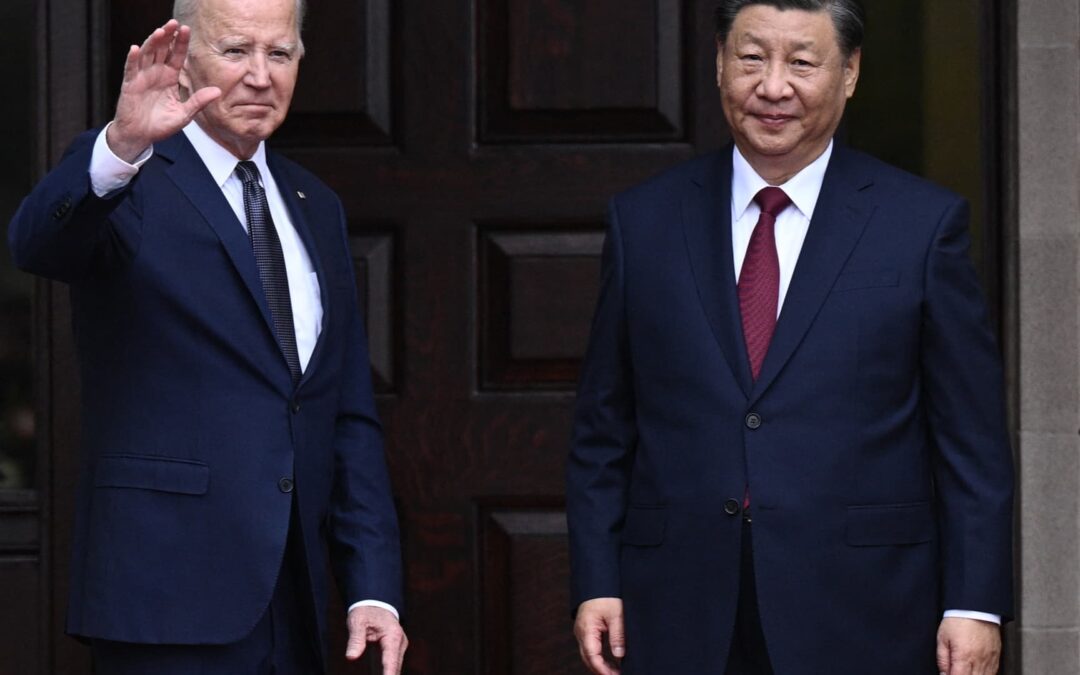U.S. President Joe Biden and Chinese President Xi Jinping before a meeting during the Asia-Pacific Economic Cooperation leaders’ week in Woodside, California, Nov. 15, 2023.
Brendan Smialowski | Afp | Getty Images
The Biden administration doubled down on its support for Taiwan’s democratic process ahead of a presidential election on the island that will serve as a bellwether of mainland China’s creeping influence over Taiwan, which China claims as its territory.
A senior Chinese liaison to Taiwan warned recently that Saturday’s election would be a choice between “peace and war.” Beijing has also cautioned Washington not to get involved.
The election results will have ripple effects on geopolitics and global trade. Depending on the outcome, they could also trigger an increase in Chinese military activity in and around the island.
The White House is preparing for several different outcomes.
“Anytime we’re heading into a period of higher tension, there are of course always contingency conversations in the U.S. government,” a senior administration official said late Wednesday on a briefing with reporters.
“I don’t want to get into specifics on those, but of course, we have to be prepared and thinking through any eventuality … ranging from no response to the higher end,” the official said.
The White House insists that the United States does not endorse any of the top three candidates. This does not mean Washington is staying entirely on the sidelines, however.
An “unofficial delegation” of Americans will travel to Taiwan’s capital, Taipei, immediately after the election to reinforce its partnership with the island “face-to-face,” the senior administration official said. “It is no secret that Beijing has a view on the outcome of the election, and is trying to shape its course in various different ways.”
Lai Ching-te, the candidate for the incumbent Democratic Progressive Party, is viewed as likely to maintain the status quo in relations with China and with the U.S., making him Beijing’s least favorite choice.
Opposition candidate Hou Yu-ih has expressed openness to closer relations with mainland China.
A third candidate, retired surgeon Ko Wen-je, is a former mayor of Taipei who has positioned himself as a pragmatist and a moderate.
Taiwan has reported myriad attempts by the Chinese government to influence the election via disinformation campaigns, cyberattacks and economic coercion.
The cautiously defiant message from Washington on Taiwan follows two days of meetings Jan. 8-9 between the Pentagon and China’s defense ministry.
Deputy National Security Advisor Jon Finer also met with his Chinese counterpart Wednesday to emphasize, among other issues, the U.S. commitment to “peace and stability across the Taiwan Strait.”
These meetings build on President Joe Biden’s November one-on-one with Chinese President Xi Jinping in San Francisco, which aimed to end the bitter freeze that has characterized recent U.S.-China relations.
At the November summit, Xi bluntly stated that he intends to reunify Taiwan with mainland China and will not rule out military force to do so.
At the meetings earlier this week, China demanded that the United States “stop arming Taiwan and oppose Taiwan’s ‘independence.'”
The U.S. regularly sends millions of dollars in defense aid to Taiwan, including a $300 million package in December that triggered Chinese sanctions against U.S. companies.
“Taiwan is a key part of global supply chains,” the White House official said. “A disruption to peace and stability across the Taiwan Strait would seriously damage the global economy.”
China has maintained military pressure on the island with hovering satellites, military aircraft, ships and balloons. China also revoked tax concessions for certain imports to Taiwan, claiming the island had violated parts of its trade agreements, and extended a probe into those violations until Jan. 12, just a day before Taiwan’s election.









